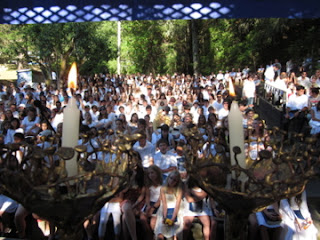What I learned at Camp Newman #4 - Change your perspective
Number four: change your perspective While we were at camp we experienced the first rainy day in summer ever in the 17-year history of Camp Newman. This is California; rain gear wasn’t even on the packing list! And this was serious rain—not a drizzle, but a downpour most of the day. Trying to entertain 600 very active kids indoors all day was a challenge, but it wound up being a great day. It started with reciting the schecheynu at breakfast; from the beginning, the counselors and campers faced the day with positive energy. It was not a rainout—it was an adventure. There were lots of board games, and tables were flipped over for indoor gaga. The camp was like a multiplex, with every available room showing a movie. There was even a sculpture-making class in the director’s kitchen. What could have been a disaster turned out to be a fabulous day. Sometimes you have to just be flexible—take a step back and look at the bigger picture; one rainy day was not going to ruin camp. Our expe
